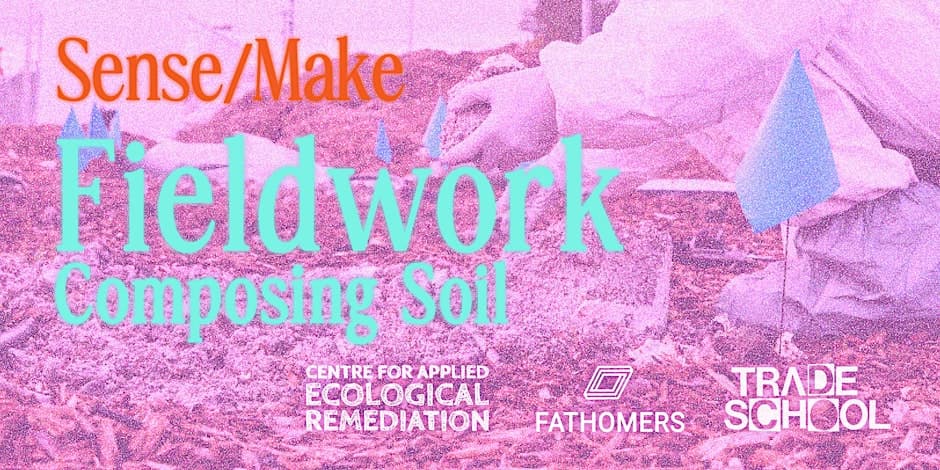
Join us in the field at a bioremediation site! Learn about land through sensory experiments and create a collaborative ‘composition’.
What forms of life are present on a contaminated site? How do we attune ourselves to their needs in order to support a path to healing? Join us for Fieldwork— Composing Soil, the second of the three-part interdisciplinary series, Sense/Make, in which we explore the ways in which ecological remediation and creative practice bolster one another. No previous workshop participation necessary.
Beginning on a field site in Altadena, learn how to safely interact with and explore a contaminated site with Dr. Danielle Stevenson of the Centre for Applied Ecological Remediation (CAER). Investigate the composition of soil by taking and analyzing environmental samples and attending a demonstration of remediation in-the-field. Tune in to land, plants, and fungi through sensory experiments in field sketching and recording led by Arden Stern and Casey Anderson, co-founders of Trade School.
Afterwards, gather at Trade School to assemble field notes into a shared "composition" of the day and enjoy seasonal soup by Altadena-based Sparkles Soup
All participants will need to complete a waiver for entry onto a contaminated site. Proper PPE (including masks, gloves, and boot covers) will be provided. The first part of the workshop takes place at a remediation site where there will be limited hospitality (porta potty only).
30-person limited capacity (advance reservation encouraged)
Refreshments provided.
This workshop is for ages 15+. For accessibility accommodations and questions, please contact aqz@fathomers.org.
Danielle Stevenson is a pioneering mycologist, environmental scientist, and educator specializing in mycoremediation and sustainable practices. She holds a PhD in Environmental Toxicology from the University of California, Riverside. She has collaborated with communities, researchers, and policymakers to implement bioremediation projects that utilize fungi and other natural systems to clean up pollutants like heavy metals and hydrocarbons. Her initiatives include Healing City Soils, which combines science and community collaboration to tackle urban pollution and support sustainable land use, and D.I.Y. Fungi, which harnesses the power of fungi to address environmental challenges such as soil contamination, pollution, and ecosystem restoration.
Arden Stern is a scholar of U.S. visual culture and design history whose current research analyzes the labor history of graphic design in the United States and material histories of digital media. They currently teach in the department of Humanities and Sciences at ArtCenter College of Design, where they are a proud member of the ArtCenter Faculty Federation (AFT Local 5648). Arden has been the recipient of research fellowships from the Walter P. Reuther Library, Winterthur Library, and American Antiquarian Society, as well as of ArtCenter's Samsung-endowed Faculty Enrichment Grant and the Hoffmitz Milken Center for Typography Educator Grant. Arden has contributed to various publications, including Design and Culture, Design Issues, and Print, and are currently preparing a book manuscript that analyzes race and labor hierarchies in United States graphic design history.
Casey Anderson (they / them) is designing and repurposing technologies to activate participatory practice, primarily involving explorations of sound, in diverse cultures and communities. Performances, exhibitions, and residencies include MOCA - Los Angeles (CA), ISSUE Project Room (NY), STEIM (NL), Atlantic Center for the Arts (FL), Mass MOCA (MA), The Walker Art Center (MN), and The Geffen Contemporary at MOCA (CA). They co-founded, and co-edited (with John P. Hastings and Scott Cazan), the Experimental Music Yearbook, and own and operate a wave press. They currently live in Los Angeles, California, co-run Trade School with Arden Stern, and teach at KAOS Network, UCLA, ASU, and ArtCenter College of Design.